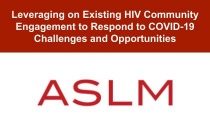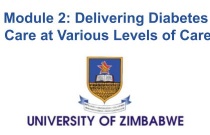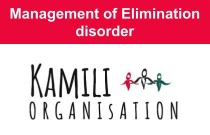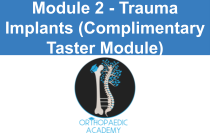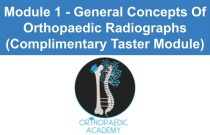Non-Lab Worker Testing Cadres and POC Tests: An Essential Combination
Mr Zibusiso Ndlovu and Dr Patrice Tchendjou
On 23 June 2022, this Extended ECHO session was convened to discuss best practices and the potential of lay health workers in supporting health services delivery, especially diagnostics at decentralised health facilities, the first point of contact for patients seeking healthcare support. In this discussion, Mr Zibusiso Ndlovu,....
Role of Network Optimisation to Achieve 95-90-0 for MTB Disease Elimination
Mr Mehan Barathlall and Prof Matilu Mwau
On 7 April, ASLM’s LabCoP convened an Extended ECHO session about the role of network optimisation to achieve 95-90-0 for mycobacterium tuberculosis (MTB) disease elimination while scaling up testing. This webinar provided perspectives from Roche Diagnostics on the role of network optimisation to achieve 95-90-0 for MTB disease....
Efforts to Increase Access to COVID-19 Ag RDT: Nigeria and South Africa Experiences
Catherine Okoi and Lynsey Stewart-Isherwood
On 15 March 2022, ASLM’s LabCoP convened a session to review efforts to increase community access to COVID-19 antigen rapid diagnostic testing (Ag RDT) services, drawing experiences from Nigeria and South Africa. A significant portion of the continent’s SARS-CoV-2 testing needs remain unmet. One key to closing this gap is a well....
Leveraging on Existing HIV Community Engagement to Respond to COVID-19 Challenges and Opportunities
Ms Stella Kentutsi and Mr Tonderai Mwareka
On 8 July 2021, this COVID-19 ECHO session was convened to discuss the perspective of Civil Society Organizations (CSOs) in leveraging on existing HIV community engagement to respond to COVID-19 challenges and opportunities. In this session, two CSOs, The National Forum for People living with HIV&AIDS Networks in Uganda (NAFOPHA....
Generating Demand for HIV Viral Load Testing Through Targeted Communications Campaigns
Pontsho Pilane, Gloria Kerubo, Idrissa Songo, Ange Mavula and Tonderai Mwareka
LabCoP’s June 2021 ECHO session focussed on generating demand for HIV viral load (VL) testing through targeted communications campaigns. WHO recommends at least one annual VL test for each person on Highly Active Antiretroviral Therapy (HAART) as this is essential in monitoring if treatment is working. Generally, knowledge aroun....
Manufacturers of COVID-19 Rapid Diagnostics Tests: BD and DiaSorin
Dr Anna Ruzhanskaya, and Dr Kuku Appiah
On 15 April, 2021, ASLM’s LabCoP hosted the 13th session in a series about manufacturers of COVID-19 molecular diagnostic tools, featuring Abbott Rapid Diagnostics and Beckman Coulter Inc. In this session, Dr Anna Ruzhanskaya, Scientific Marketing Manager, CISEE, Beckman Coulter and Dr Kuku Appiah, Director Medical and Scientifi....
Manufacturers of COVID-19 Diagnostic Products: Thermo Fisher Scientific
Jashan Gokal
On 7 April, 2021, ASLM’s LabCoP hosted the 12th session in a series about manufacturers of COVID-19 molecular diagnostic tools, featuring Thermo Fischer Scientific. This session also focussed on mutation and variant surveillance of SARS-CoV-2. Without a robust, coordinated universal effort to identify and characterize emerging v....
Genomic Surveillance of SARS-CoV-2 in South Africa
Prof Tulio de Oliveira
On 12 February 2021, this COVID-19 ECHO session was convened for Prof Tulio de Oliveira to discuss the work of the Network of Genomic Surveillance of South Africa (NGS-SA) and the need to build a genomic network in Africa. From the beginning of the COVID-19 pandemic, the NGS-SA started genetic sequencing early enough by building....
Launch of the M&E Sub-Community of Practice
Mr. Michael Maina Waweru
On 5 February 2021, ASLM’s LabCoP hosted the first ECHO session of the Monitoring and Evaluation (M&E) sub-community of practice. M&E assesses the performance of projects and programs set up by organizations to improve current and future outputs. A robust M&E system is critical to assess the performance of testing services and f....
Cord Prolapse
Dr Sarah Little
This module provides training and mentorship instruction on how manage cord prolapse.
Resuscitation of the newborn
Dr Sarah Little
This module provides training and mentorship instruction on how to perform neonatal resuscitation.
Principles of Advanced Life Support
Gavin Perkins and Ian Densham
This session outlines the principles of advanced life support for cardiorespiratory arrest in adults, according to the Resuscitation Council (UK) Advanced Life Support Guidelines 2015.
Module 6: Diabetes in Young People
Dr Trust Zaranyika, Dr Nickson Mukapa and Dr Moris Chiwanza
By the end of this module, participants will have an understanding of managing young people with diabetes.
Module 2: Delivering Diabetes Care at Various Levels of Care
Dr Trust Zaranyika, Dr Nickson Mukapa and Dr Moris Chiwanza
By the end of this module, participants will have a thorough understanding of delivering diabetes care at various levels of care. The module will cover the principles and practicalities of glucose monitoring, focusing on therapeutic targets individualized based on patient conditions, lifestyle, and overall health.
Gender Dysphoria
Simon Githui
2.00 Hours
We welcome you to this module on management of Gender Dysphoria. The aim of this two-hour module is to provide you with the knowledge and the skills in management of Gender Dysphoria. You are going to learn on clinical manifestations, causes and approaches to care to a patient presenting with this mental disorder. The module has....
Management of Elimination disorder
Mageta Kevin
1.00 Hours
Welcome to the module about elimination disorders. This comprehensive course is designed to provide you with a deep understanding of enuresis (bedwetting) and encopresis (soiling), common childhood conditions that can have a significant impact on emotional well-being and social functioning. Throughout this module, we will delve....
Sleep Wake Disorders
Pius Mwangi and Simon Githui
2.00 Hours
Welcome to the Sleep-Wake Disorders module. In this module we are going to look at of the diagnostic criteria, signs, symptoms, and management strategies for various sleep-wake disorders. We will examine conditions such as insomnia, narcolepsy, sleep apnea, restless legs syndrome, circadian rhythm disorders, and more. This modul....
Post-Traumatic Stress Disorder (PTSD)
Kevin Msafiri and Simon Githui
2.00 Hours
Welcome to the module on Post-Traumatic Stress Disorder (PTSD). We are going to look at its causes, symptoms, and the various treatment approaches available. PTSD is a condition that affects millions of individuals worldwide, often as a result of exposure to traumatic events such as combat, accidents, or personal assaults. By un....
Female Orgasmic Disorder
Mageta Kevin and Simon Githui
1.00 Hours
Welcome to this module on Female Orgasmic Disorders. This module aims to provide an understanding of female orgasmic disorder. We are going to look at its causes, clinical manifestation and the treatment approaches to persons of Female Orgasmic Disorder. This module has five multiple choice questions that you can use to carry ou....
Introduction to Cognitive Behavioral Therapy (CBT)
Pius Mwangi and Simon Githui
1.00 Hours
This introductory CBT course offers a broad understanding of the essential principles and methods of Cognitive Behavioral Therapy (CBT), a highly acknowledged and successful psychotherapeutic method. The course will focus on the foundational aspects of CBT, techniques and Application CBT in management of Mental illness
Module 2 - Trauma Implants (Complimentary Taster Module)
Mr Rajesh Gopireddy, Mr Vilas Sadekar
This module provides an introductory overview of trauma implants used in orthopaedic surgery. It covers essential concepts and practical considerations, preparing participants for more advanced learning in fracture management and implantology.
Module 1 - General Concepts Of Orthopaedic Radiographs (Complimentary Taster Module)
Justin Mooteeram, David Hughes and Piyush V. Gavai
• Gain a foundational understanding of orthopaedic radiographs, essential for accurate diagnosis and treatment planning. • This complimentary taster module introduces key concepts and best practices in interpreting orthopaedic X-rays.
Specialised Paediatric Nutrition Care in a Global Context
Centre for Global Child Health at The Hospital for Sick Children (SickKids) in Toronto, Canada
This course helps health professionals learn how to address the unique nutritional needs of children and adolescents with disabilities, those living with HIV, and small and vulnerable infants. It emphasizes tailored, family-centered nutrition care, the impact of stigma on health, and practical strategies for assessment and suppo....
Nutrition Across the Life Course: Priorities in Children, Adolescents, and Women of Reproductive Age
Centre for Global Child Health at The Hospital for Sick Children (SickKids) in Toronto, Canada
This course provides health professionals with a thorough understanding of nutrition for infants, children, and adolescents, emphasising its impact on long-term health. It covers key influences on adolescent health and teaches the HEEADSSS psychosocial interview to explore these factors. The course also highlights nutrition for....
Maternal, Child, & Adolescent Nutrition: Assessment & Intervention
Centre for Global Child Health at The Hospital for Sick Children (SickKids) in Toronto, Canada
This course will provide health professionals with foundational knowledge and skills that will enhance their ability to provide comprehensive nutritional care to infants, children, adolescents, women of reproductive age, and their families. It covers nutritional requirements, malnutrition, nutritional assessments, and key interv....



